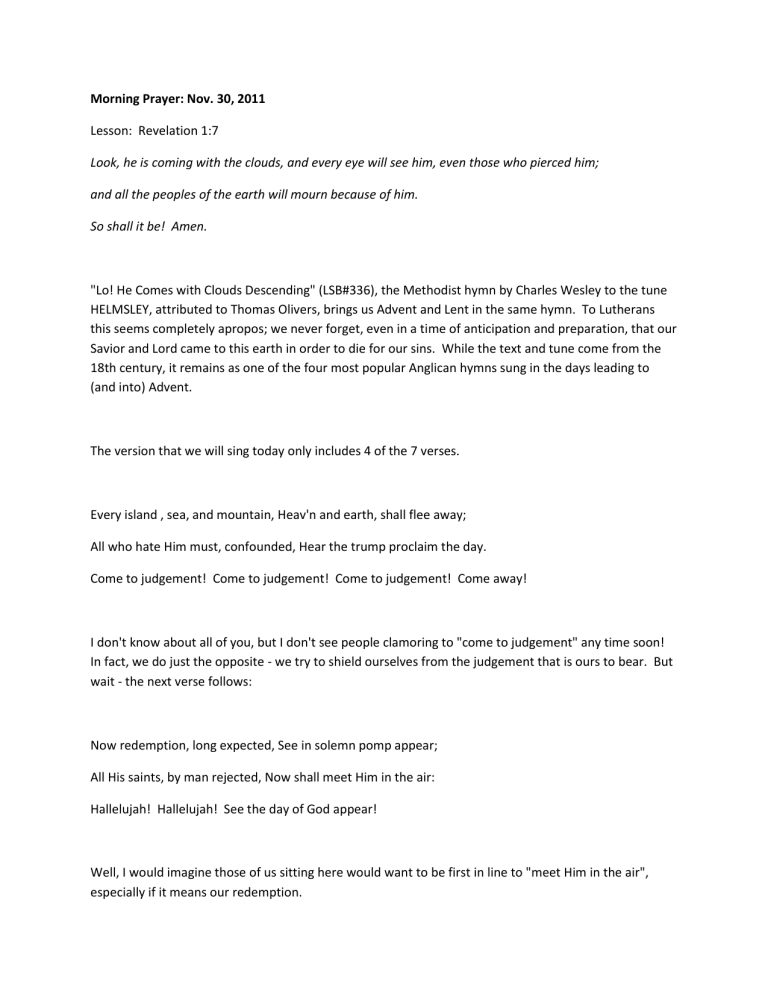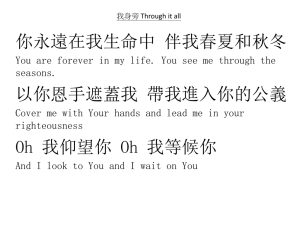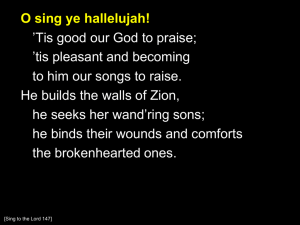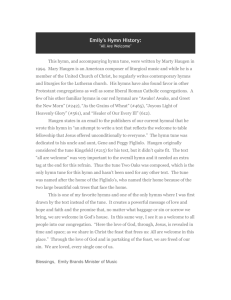Morning Prayer: Nov. 30, 2011 Lesson: Revelation 1:7

Morning Prayer: Nov. 30, 2011
Lesson: Revelation 1:7
Look, he is coming with the clouds, and every eye will see him, even those who pierced him; and all the peoples of the earth will mourn because of him.
So shall it be! Amen.
"Lo! He Comes with Clouds Descending" (LSB#336), the Methodist hymn by Charles Wesley to the tune
HELMSLEY, attributed to Thomas Olivers, brings us Advent and Lent in the same hymn. To Lutherans this seems completely apropos; we never forget, even in a time of anticipation and preparation, that our
Savior and Lord came to this earth in order to die for our sins. While the text and tune come from the
18th century, it remains as one of the four most popular Anglican hymns sung in the days leading to
(and into) Advent.
The version that we will sing today only includes 4 of the 7 verses.
Every island , sea, and mountain, Heav'n and earth, shall flee away;
All who hate Him must, confounded, Hear the trump proclaim the day.
Come to judgement! Come to judgement! Come to judgement! Come away!
I don't know about all of you, but I don't see people clamoring to "come to judgement" any time soon!
In fact, we do just the opposite - we try to shield ourselves from the judgement that is ours to bear. But wait - the next verse follows:
Now redemption, long expected, See in solemn pomp appear;
All His saints, by man rejected, Now shall meet Him in the air:
Hallelujah! Hallelujah! See the day of God appear!
Well, I would imagine those of us sitting here would want to be first in line to "meet Him in the air", especially if it means our redemption.
Answer Thine own bride and Spirit, Hasten, Lord the general doom!
The new Heav'n and earth t'inherit, Take Thy pining exiles home:
All creation , all creation, Travails, groans, and bids Thee come!
Again - hasten the general doom? We aren't anxious to embrace that, but when we think about it, we need to do away with the old to bring in the new. To quote from "Mere Orthodoxy" and a post from
Tex, "The cry of the Church and of God the Spirit is for such a perfect state to come where all is peace and harmony and love, where communion between God and man is like the unity shared by the Blessed
Trinity. The birth pangs are necessary to bring about new life."
Okay - so these last 3 verses are what we *won't* sing today. But perhaps we can keep them in mind as we sing the tune, reminding ourselves of the greatest gift that God has given us - His own Son for our sakes.
I would be remiss if I didn't address the tune, for obvious reasons. :) The setting that we sing today is by
Ralph Vaughan Williams, a 20th century British composer who was not known to be a believer, although his compositional output included many sacred works. He beautifully captures the tune that Olivers first claimed in the 18th century. From a musical standpoint, the form is A A B. To quote from "Hymnal
Companion to Evangelical Lutheran Worship" (which version changes a bit of the text) - "its range of an octave and a third drives its lowest pitch a bit too low, its seventh near the end pushes the congregational envelope, and its repetitions verge on excess, but...the tune works. It presents congregations a challenge worth pursuing. Like Martin Luther, John Wesley (brother to Charles who included it in his Sacred Melody in 1765) expected no less. 'Let not a slight degree of weakness or weariness hinder you,' he said. 'If it is a cross to you, take it up, and you will find it a blessing.'"
The talk of octaves, thirds, and a seventh towards the end may not mean much to people who just want to sing the hymn, but it captures, in my mind, the idea that in our expectant waiting for Jesus in this season of Advent, we are reminded that He will come again, descending with clouds.
To quote once more from Tex at "Mere Orthodoxy" - "Remembering the first coming of Christ in light of the end of all things ought to remind us how desperately we need a savior - and how immense and earth-shattering is the good news that God is just and merciful."
Maura Janton Cock
Lecturer in Music
Administrative Assistant, The Bach Institute at Valparaiso University




